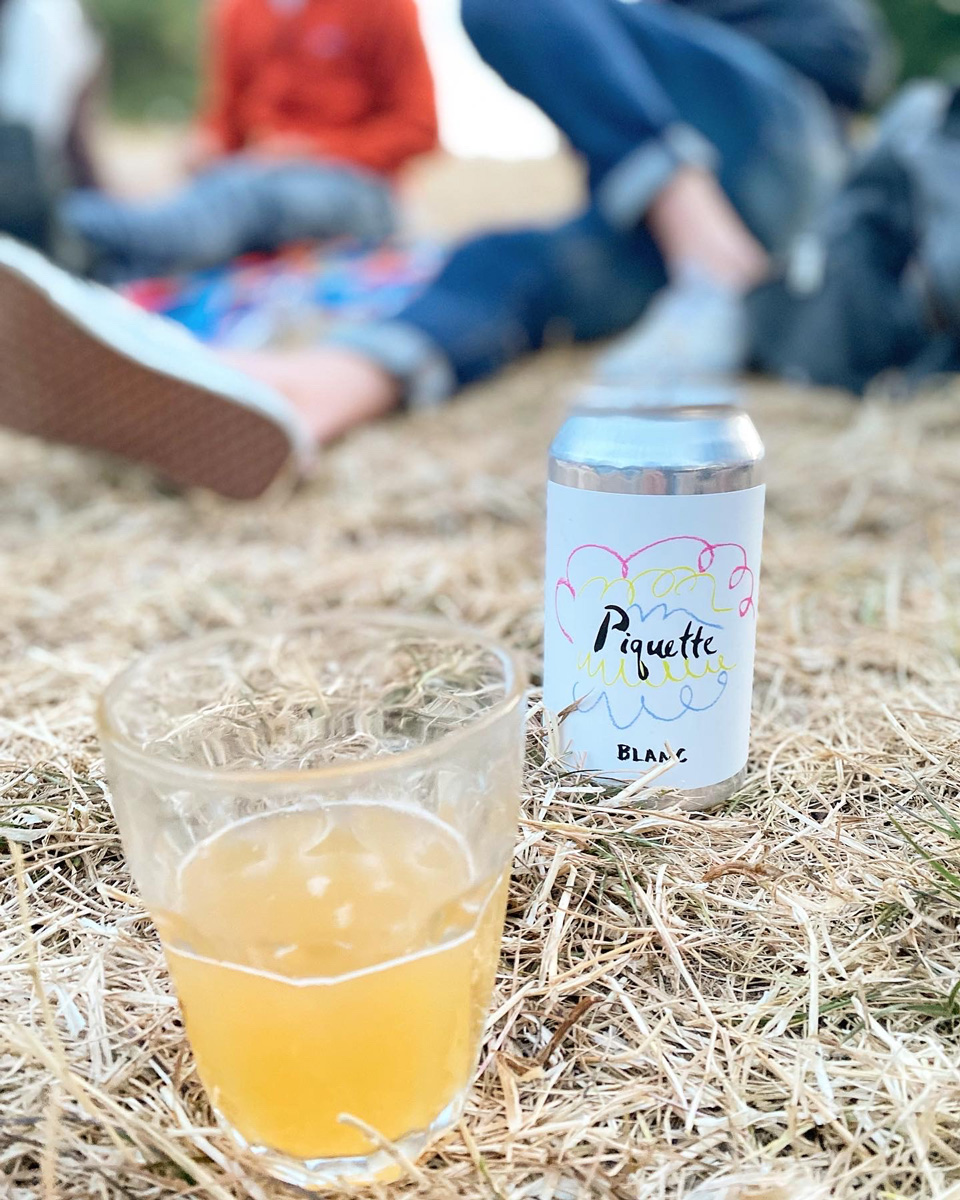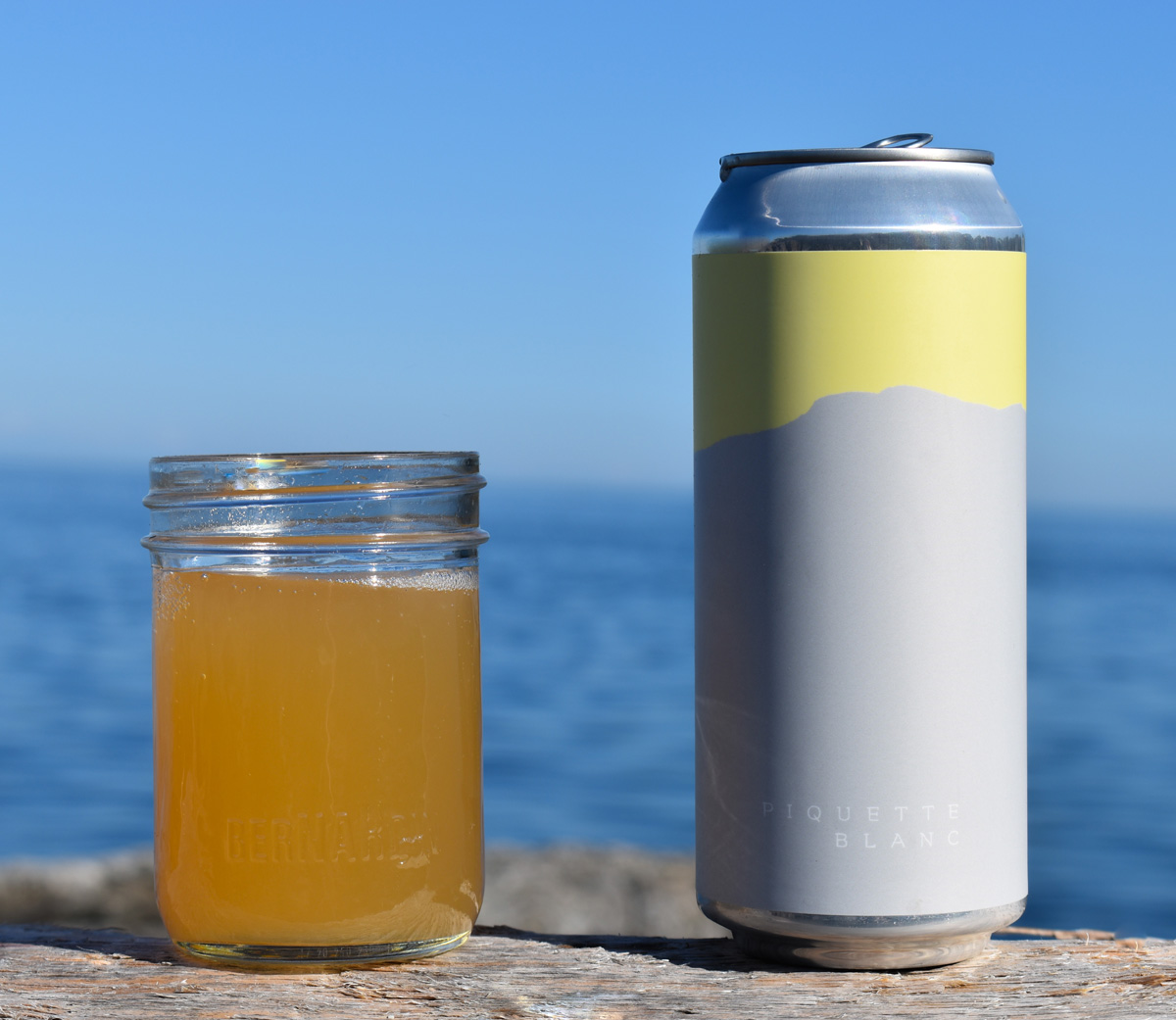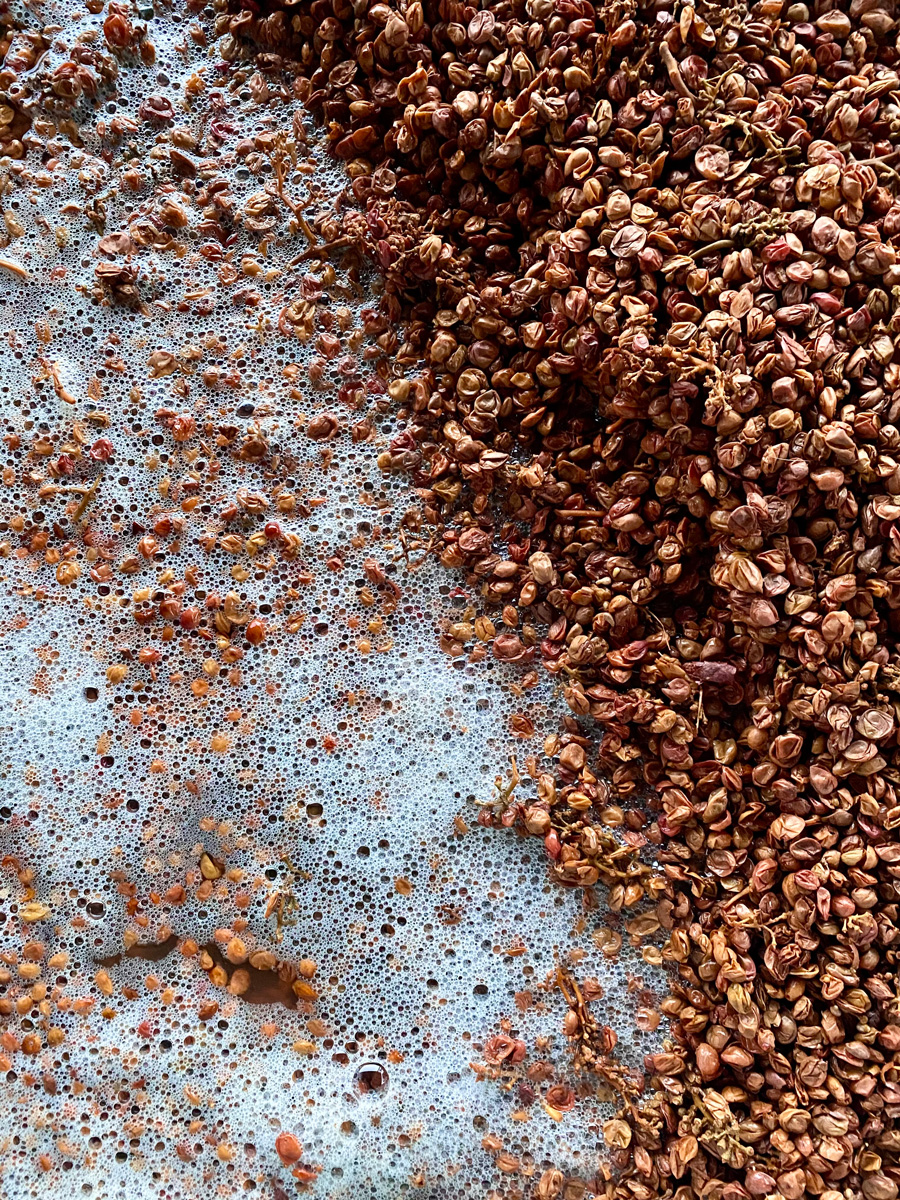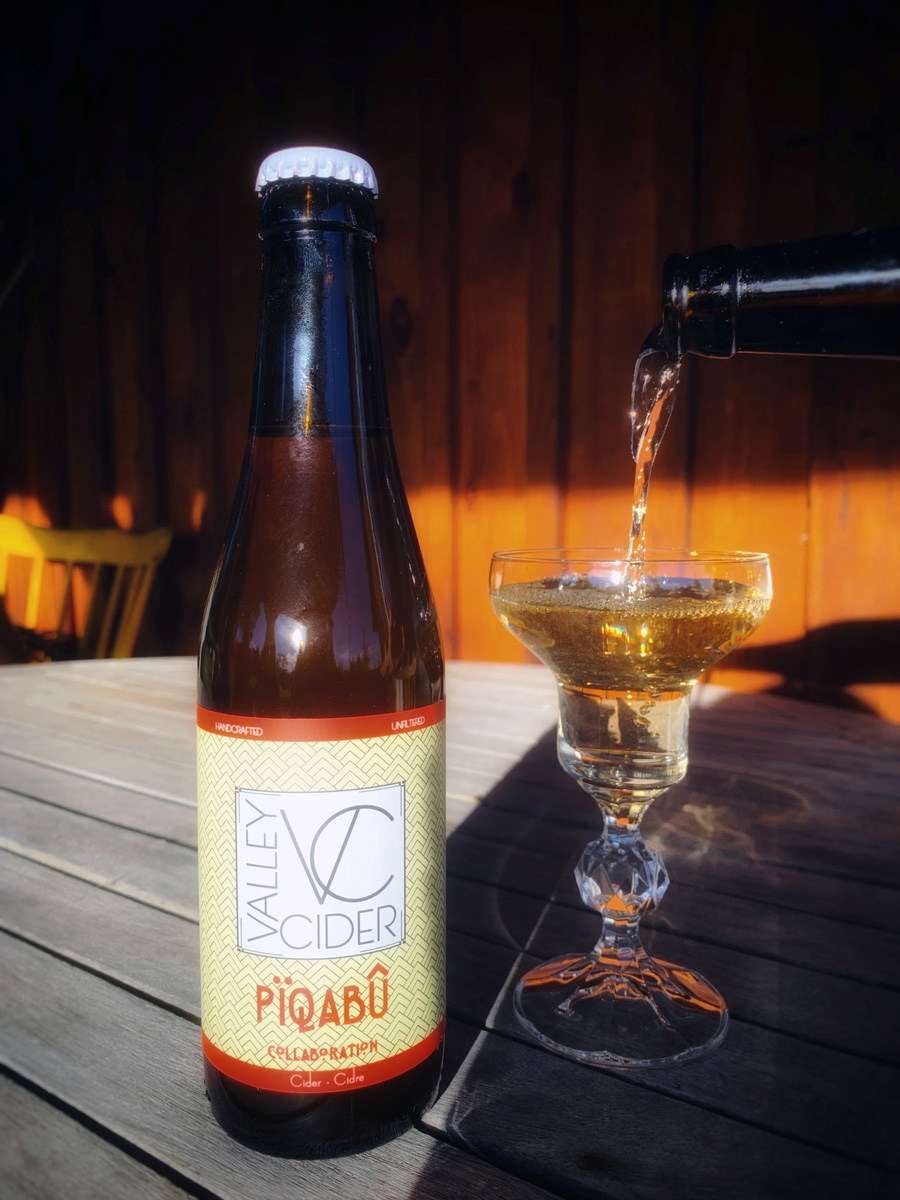
Wine Culture Magazine

A Sunday In August Piquette Blanc. Sam Milbrath photo
It was worries about waste that led Cowichan Valley winemaker Brent Rowland to turn pomace into piquette. The juicy skins and seeds left over after pressing the Gewurztraminer, Pinot Noir and Maréchal Foch grapes for his Averill Creek Joue Rosé were simply too tasty to send straight to the compost pile.
“We work a lot with Gewürztraminer and the flesh is very gelatinous, yielding a lot less juice,” he says. “I hated dumping the press with a ton of goodness still in it, and that’s when my mind started to tick.”
Rowland produced his first Piquette Blanc and Piquette Rouge this year, following the traditional method of fermenting the spent skins with water to create a simple, low-alcohol quaffer. The white is a little hazy, with typical Gewürz aromas and a tart, citrusy finish, while the juicy red gets its intense inky colour and wild character from the Foch skins.
“I just put it into the bins with water straight away, and fermented it in barrel for three to four months,” says Rowland. The piquette gets a final dosage of sugar and yeast before it’s canned or bottled for a touch of effervescence. Averill Creek Piquette is unfined and unfiltered, and clocks in at just 4.5% ABV.
“It’s definitely not a wine—for me it’s in the genre of wheat beer or kombucha, very light and refreshing,” says Rowland. “Piquette is not a noble beverage—it’s not supposed to be precious.”
But its current popularity seems to make it so.

Averill Creek Piquette Blanc. Photo courtesy of Averill Creek Vineyard
When Rowland released his small batch of piquette this summer (475-millilitre cans for $6) the uptake was immediate. Piquette appears to be a libation for the moment—affordable, easy drinking, and a cool, sustainable way to upcycle the by-products of wine making.
Yet piquette is not new. Piquette has a long tradition in France, Italy and other Old World wine regions where it’s known as “the worker’s wine,” a rustic, thirst-quenching beverage produced for farmhands and home/winery consumption. In fact, in the EU, it’s illegal to sell piquette.
On this side of the pond, piquette production began with small natural-winemakers looking for a new way to squeeze every drop from their most valuable inputs. Now some of the bigger players are getting into the recycling game, too, banking on fruity piquette as the gateway to wine for the beer and hard seltzer generation.
But what determines what a piquette will be?
A cursory tasting of the various piquette products now available in B.C. liquor stores runs the gamut from tart pink spritzers to funky hazy brews, reminiscent of kombucha or even sour beers. Piquette can be light and lovely, a little challenging, or frankly, forgettable.
Mike Schindler, the co-owner and winemaker at A Sunday in August, is known for his organic, natural, low-intervention wines and is a piquette pioneer. His colourful, cloudy brews—the amber Blanc piquette, salmon pink Rosé and deep purple Rouge—are layered and alive.

At A Sunday in August, spent grape skins from winemaking (a.k.a. pomace) are fermented to create piquette. Sam Milbrath photo
This year will be Schindler’s and partner Sam Milbrath’s third piquette vintage. They buy organic grapes from Okanagan growers, and make their wine and piquette in Kelowna, refermenting their organic pressings with water, additional wine, and a final dosage of organic honey for a spritzy second ferment.
A Sunday in August piquette clocks in at 7% ABV and, at $10 for a 355 mL can ($31 per 750 mL bottle), is one of the priciest piquettes on store shelves, which Schindler says reflects the cost of his organic inputs and natural production methods.
“Piquette is not easy to make,” he says of his fizzy wines. “Lots can go wrong if you’re not scrupulously clean and careful, but we have experience with making natural, wild-ferment wines. There’s absolutely nothing added.”
Schindler says piquette is a drink designed to serve ice cold and appeals to a new generation of wine drinkers.
“I want my wines to be accessible, I want younger people to be drinking them,” he says, “and piquette is something totally crushable, a wine to take to the beach.”
There are several other Canadian wineries making piquette—from Bella Wines in Naramata and Benjamin Bridge in Nova Scotia to Tantalus in Kelowna, their 2020 Old Vines Riesling piquette garnering a respectable 86-point score from a prominent B.C. wine scribe.
The only piquette listed in B.C. government liquor stores is The Second Act “field blend” piquette produced by Artisan Wine Co. in Oliver, one of the Okanagan’s major producers, creating several value wines for Mark Anthony Brands. This year Artisan made 800 cases of this clear pink piquette (sold in 750-millilitre bottles for $14.99), with plans to expand production for national distribution next year.

Pïqabû piquette-style cider. Photo courtesy of valley Cider
Craft beer and cider makers are playing with piquette, too. Valley Cider Co. in Duncan makes a piquette-style cider called Pïqabû, their artisan cider refermented in small batches with grape pomace from nearby Emandare Vineyard to create a vinous, apple-forward sipper. A crown-capped, 359 mL bottle of Pïqabû has 6.5% ABV and sells for $5.49.
“Piquette is perfect for those of us who are drawn toward craft and natural production, and lets us reuse things that are still usable,” says Valley Cider’s Bruce McKinlay. “Mike [Nierychlo of Emandare] is a phenomenal ambassador for craft wines, and I bamboozled him into letting me use his extra Sauvignon Blanc and Gewurztraminer skins to do it.”
Meanwhile, in Vancouver, Steamworks Brewing has made piquette to serve in their taproom, using B.C.-grown Viognier and Cabernet Franc pomace, fermented with wild yeasts, and conditioned with Fraser Valley honey and cultured m. reukaufii yeast for an aromatic, fruity finish.
“It’s an interesting way to take grapes to another level,” says Brett Jamieson, Steamworks’ research and development manager.
It’s hard to know if piquette will catch on or fade quickly, but so far, it’s been extremely popular.
Because there are no hard and fast rules for making piquette, experimentation is rampant. Brettanomyces (Brett) and volatile acidity, usually considered faults in wine, are often part of the piquette flavour profile, but that’s not a problem for the “fermentation generation,” familiar with the wild yeasts that sour beer and create kimchi.
Piquette makes sustainable sense, too, especially for eco-minded drinkers and smaller producers aiming to reduce waste. A single-serve wine beverage, often sold in cans, piquette also appeals for its portability, and as an alternative to hard seltzers and craft beer.
But unlike the latter, piquette is a seasonal drink, so production is limited to the post-harvest period.
Expect to hear more about piquette after the next vintage is crushed, a new idea that’s hot off the press.

Cinda Chavich is a Victoria-based food and wine journalist. She covers food and drink for YAM, EAT and TasteReport.com, has written for The Globe and Mail, WestJet and Maclean’s, and is author of The Waste Not, Want Not Cookbook.

Cinda Chavich is a Victoria-based food and wine journalist. She covers food and drink for YAM, EAT and TasteReport.com, has written for The Globe and Mail, WestJet and Maclean’s, and is author of The Waste Not, Want Not Cookbook.
@ Vitis Magazine